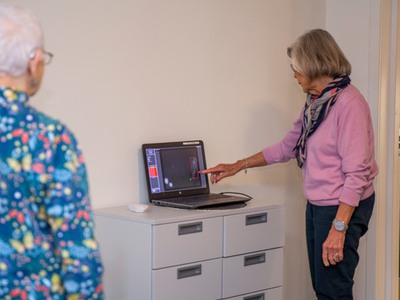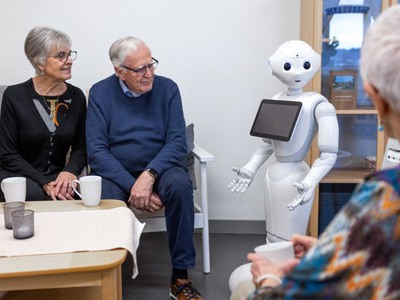Meeting a new partner later in life or simply parking the car? Nowadays, we use digital tools for almost everything. A new study from the University of Skövde shows that older people who have embraced digital technology feel less lonely.
 Anna Dahl Aslan, and Martin Gellerstedt, both Professors of Health Sciences at the University of Skövde.
Anna Dahl Aslan, and Martin Gellerstedt, both Professors of Health Sciences at the University of Skövde.
Is there a link between involuntary loneliness and digital skills among older people? This is a question that the University of Skövde and Skövde Municipality have explored in a joint project.
"We know that digitalisation poses a major challenge for older adults. We also know that involuntary loneliness is a major public health issue. That made us curious about whether there could be a link between the two factors," says Anna Dahl Aslan, Professor of Health Sciences.
The study was conducted through a survey. The responses reveal the following results, among others:
- The more older people use and have embraced digital tools in their everyday lives, the less lonely they feel.
- Many older people avoid digital technology and the internet due to insecurity and fear, including fear of online crime.
- Age in itself is not a factor associated with loneliness.
The right motivation – increased interest
According to Martin Gellerstedt, Professor of Public Health Sciences, the results suggest that changing attitudes towards older people and digitalisation could have positive effects, particularly in how we talk about technology:
"Learning new technology can feel difficult. But if you see the benefits – that it can help you make new friends, buy what you want, or participate in society – your motivation might increase," says Martin Gellerstedt.
Another significant factor is the fear many older adults feel of having their identity stolen, being deceived, or not being able to use digital tools correctly.
"Those who have not learned how to use parking apps may avoid going into town, and those who cannot read the newspaper online may not know what is happening locally. Such barriers risk creating another kind of loneliness: a feeling that society has left you behind," explains Martin Gellerstedt.
Safety – a key issue
The research project will conclude at the turn of the year – but the work will continue. The next step will be to look more closely at issues of safety, such as how to support older adults so that they feel secure online.
"The study suggests that actors aiming to support older adults in embracing digitalisation need to have a clear focus on safety aspects and communicate in a way that inspires motivation. There are good opportunities here to explore different approaches," says Anna Dahl Aslan, adding:
"It is important to understand that digitalisation should be seen as a complement, not as a one-sided solution. The strongest risk factor for loneliness is poor mental health. It is therefore generally important to promote social inclusion in various forms in society."




